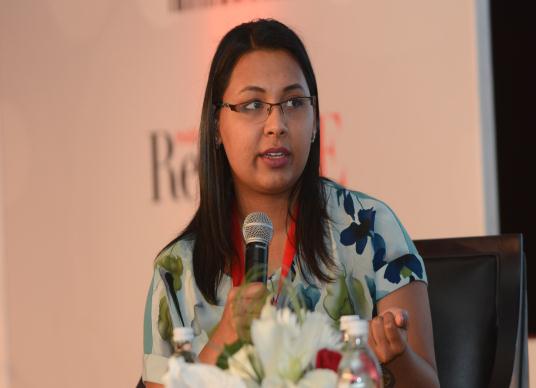
What motivates a young entrepreneur to try something new, whether in a family business or a new start up? How does innovative thinking reflect in the process? Three scions of business houses who joined the family business – Narain Jashanmal (general manager – books & magazines division, Jashanmal Group), Nisha Jagtiani (business head, Iconic) and Shafeena Yussufali (CEO of Tablez Food Company) – and a fourth entrepreneur Devayani Dayal (CEO/owner, She Moves Company LLC) who started a business, talked about the opportunities and challenges at the Middle East Retail Forum 2013.
A family business provides the luxury of a well-built infrastructure. On the other hand, there’s a sense of fulfilment in starting something from scratch. But what all four participants agreed upon was the importance of thinking differently.
“We’ve experienced retail around the world. That’s helped us formulate great ideas. It’s about tapping into experience and exposure and bringing the entrepreneurial spirit into our business to drive innovation,” says Jashanmal.
“Yes, retail is all about innovating. If R&D and innovation stop, a business stagnates. You have to think out-of-the-box to bring new ideas to the table. Most of our group businesses were created in a nascent market. Today the playing ground is overcrowded. Creating a fashion brand without a unique identity in such a scenario is a fruitless endeavour. The big challenge is creating a niche – offering something to the regional market in consonance with global fashion trends, yet ensuring newness,” elaborates Jagtiani, whose Iconic is part of the Landmark Group.
Yussufali agrees, but thinks innovation, though a gorgeous word is much overused, with little understanding of the effort and hard work that goes into it. “There’s no denying innovation is the lifeblood of any business. But it isn’t easy innovating in business – whether an existing one or a start-up. It requires a lot of in-depth research and analysis,” she points out.
The young entrepreneur talks from experience, having initiated new F&B concepts for Tablez – Bloomsbury, De Thali and Peppermill – within the Lulu Group. “We wanted to introduce our clientele to interesting and innovative food concepts. Take the example of the cupcake range we offer at Bloomsbury. We added unusual flavours such as dates, saffron, mint, cardamom and the like to evoke curiosity and challenge the palate of our customers with new tastes,” she adds.
Dayal, too, feels innovation is too much of a buzzword. If seen in its correct sense it means making a retail concept stand out in the crowd. She cites the example of how consumer feedback led her to innovate in her own start-up She Moves, which offers activewear and dancewear to women. She began as an online portal but soon realised her audience acutely felt the lack of a touch-and-feel option, so she added a brick-and-mortar set-up to complement her online presence – a reversal of the norm.
“The UAE and Middle East will continue to prefer a retail store experience to online shopping. We do see a spike in traffic sometimes, especially during a promotion. But that doesn’t necessarily translate into conversion,” Dayal admits.
Jagtiani begs to differ. “E-commerce is definitely the future and will grow even bigger over the next four-to-five years,” she believes.
Yussufali also feels it’s important to have a strong online presence. “It’s vital to actively manage listings on Zomato and TripAdvisor to drive people to try out our F&B concepts. Take-aways account for 10-to-15% of our sales so these sites are crucial and play a significant role,” she adds.
Jashanmal draws attention to another game-changing aspect – consumer behaviour, which is re-drawing the contours of modern business into a multi-channel reality. “We are dealing with super savvy, informed and cost-conscious consumers. It’s important to understand the way their minds work – how they research products using social media and other platforms, what exactly they are looking for, at what price points? These considerations will definitely help us connect with consumers in a better way and save us the horror of having a disgruntled customer tweeting about a bad experience even before leaving the store,” he emphasises.
The general consensus emerging out of the discussion was that making balanced use of all channels and touch-points – brick-and-mortar, new media, technology – and thinking out-of-the-box are what contribute to making a business successful.
You must be logged in to post a comment.